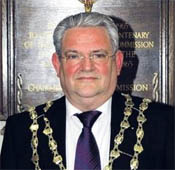
ABOVE: Nigel Howard Malpass
[See update at the end of this post.]
Who is Nigel Malpass? Well, for starters, he was elected in 2008 as a local authority commissioner for Ramsey, a hamlet on the Isle of Man, the rogue tax haven and Internet casino situated in the Irish Sea. In May, he was elected Chairman of the local commission, which is why he’s wearing that odd necklace in the photograph illustrating this post. And on Monday, he was fingered by an article in the New York Times as one of the chief architects of a scheme to set up shell companies used by the Islamic Republic of Iran Shipping Lines (“IRISL”) to skirt U.S. sanctions imposed against the company.
This blog has previously reported that almost as soon as these sanctions were imposed, IRISL began to take steps to evade them. We noted that IRISL began changing the names of its ships from the names shown on the SDN list to new, and less Iranian-sounding, names. The Iran Bojnoord became the Uppercourt, adding, no doubt, a daily tea service on board, complete with scones, crumpets and a stiff upper lip. Back in April of this year, we discussed a report from the Wisconsin Project on Nuclear Arms Control that found that IRISL, in addition to re-christening ships in its fleet, was transferring ownership of individual vessels to shell companies organized outside of Iran but ultimately owned by IRISL or its affiliates.
The New York Times article treats this old news as a journalistic scoop, which it isn’t, but the story does supply many interesting details on how this shell game is being played. According to the article, all but 73 ships now have had a change in name and ownership. But most interestingly the article fingered Malpass, a Manx “marine consultant,” as a major facilitator of Iran’s efforts to avoid the sanctions on IRISL. The Times pointed to a
network set up with the help of Nigel Howard Malpass, a British shipping consultant who serves on the boards of Smart Day and companies connected to 43 other ships previously registered to [IRISL], records show.
Understandably, now that Malpass’s role has become public, he’s busy trying to run away from it as fast as he can.
“I did used to be involved with [IRISL],†Mr. Malpass said in a telephone interview, adding that while he had set up companies at the company’s behest, he had since “disassociated†himself.
But the Times article says Malpass is still on the Board of 43 of the IRISL shell companies. That’s not normally what anyone would call disassociation.
If OFAC wants to make an end of IRISL’s shell game here, it seems that putting Mr. Malpass on the SDN list might be a good first step. This measure could be easily defended if the Times is indeed correct that Malpass admits to setting up companies for IRISL and that he still serves on the Board of 43 of the shell companies.
Often these designations of third-country nationals might pose some issues of diplomacy, but here I think those considerations are largely absent. What is the Isle of Man going to do to the United States if Malpass is designated? Cut off access by U.S. nationals to its online gambling empire?
Update (4:26 p.m.): Mr. Malpass could be targeted under the terms of the newly proposed Iran sanctions, a draft of which was released today. Paragraph 19 states that asset blocking and travel restrictions shall apply to “any person or entity acting on [IRISL’s] behalf or at [its] direction.” This would require U.N. members to block any of Malpass’s assets in their territory and to implement a travel ban against Malpass assuming, as noted above, that he organized (as the Times article says he admits) the IRISL shell companies and served or serves as directors of those companies.
Although the Isle of Man is not a member of the United Nations or the European Union, the Island has in the past independently implemented Iran sanctions once they were implemented by the E.U. The Isle most recently did this with U.N. Security Council Resolution 1747. This could put Mr. Malpass in an awkward financial position if the U.N. passes this latest round of U.N. sanctions, as it is expected to do.
 Permalink
Permalink
Copyright © 2010 Clif Burns. All Rights Reserved.
(No republication, syndication or use permitted without my consent.)

 Posted by
Posted by  Category:
Category: 

